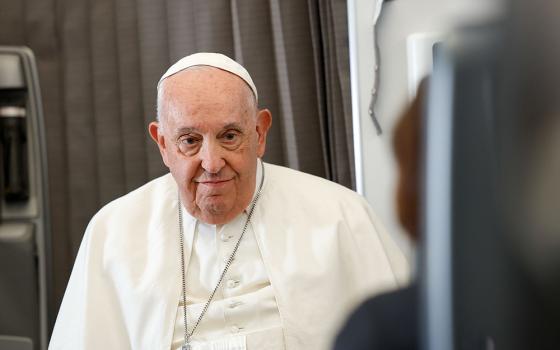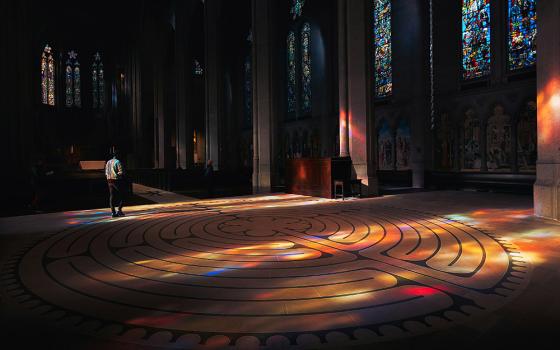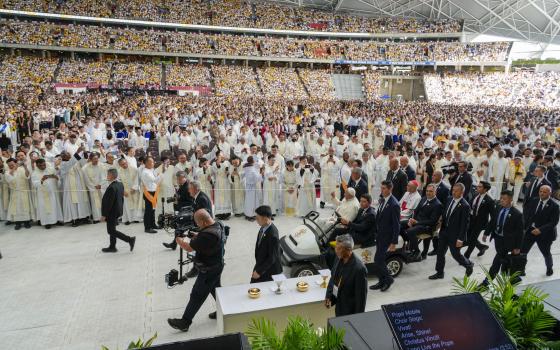In the lore of the Sisters of St. Joseph, there is a story of how Mother Cecelia Bowen of Springfield, Massachusetts, taught her sisters what integrity demanded of anyone who wished to dress as a woman religious. In the 1880s, on the very day that a group of novices were given the habit, she marched all of them out to spend their first afternoon as nuns with the people in the almshouse. She even had one of them empty her trunk so it could carry what the group was bringing to the people and the things necessary to celebrate the Eucharist with the poor. Those young women, newly dressed as nuns, would never forget that their habit was a sign of their commitment to Christ’s poor.
Mother Cecelia would have well understood why Jesus did what he did in the Temple. On the day Jesus made his first public appearance in Jerusalem, he took on the temple establishment for perverting the core symbol of God’s presence among the people by making what was intended to be a place of communion into a business venture. But Jesus’ “cleansing of the temple” was more than just a violent reaction against attempts to sell grace. It was actually his first proclamation about who he was and what his mission would entail.
John loves to hide hints to deeper meaning in his Gospel, thus enticing his readers to go back and find more each time they encounter it. In this story, Jesus arrives at the temple area and calls it his Father’s house; with that he is claiming to be God’s Son as described in Psalm 2. As he lashes out against the temple merchants and bankers, the disciples perceive that Jesus is like Jeremiah whose passion for God’s work will bring him persecution.
Finally, Jesus engages in his first cryptic conversation with the leaders of his people. Upset that he has disrupted the business of religion, they demand that he authenticate himself by some sign that proves he is of God. Taking their words far deeper than they intended, he said, “Destroy this sanctuary and in three days I will raise it up.” They completely missed his implication. As if they didn’t understand the difference between the holy of holies and the entire temple complex, they responded that the work of construction had gone on for more than two generations, “and you will raise it up in three days?” They were concentrating on protecting a building and its enterprise; Jesus was passionate about God’s presence in their midst. As they accused him of disrespecting the Temple, he was reacting to their perversion of what the Temple was and what it symbolized. He insisted that in spite of their profanation, nothing could overcome God’s will to dwell amid humankind.
Beginning with the reading from Exodus presenting the commandments which set the boundaries on how the people of God live in communion with God and one another, today’s Scriptures are a call to authenticity in our life and worship. Paul tells us not to look for great signs or sophisticated theories but to concentrate on God’s unexpected and countercultural message of love via the cross. Crowning it all, John’s Gospel depicts Jesus making a living theater of God’s rejection of religious practice that is anything less than an expression of love.
Jesus did what he did in the Temple because he believed he was the Son of a loving God who wanted nothing more nor less than the whole heart of the chosen people. When he walked into that Temple, his faithfulness demanded that he act out God’s judgment on what was happening there — no matter the cost to himself.
The disciples spoke of his zeal, which is a word that could also describe passionate integrity. As we contemplate this Gospel and the readings that fill out its message, we are asked where we stand in the scene John presents. Do we take the side of those who defend business as usual, ignoring how often the busyness of our pursuits and our concerns for externals blind or protect us from a vibrant and even surprising relationship with God? Do we stand on the sidelines with the disciples who see prophetic actions and remain as cheering spectators who applaud and say, “Wow! That looks like somebody who really believes in God!” Or are we willing to follow God’s Son and try to live with the sort of integrity that will keep us on the margins of respectable society and close to the heart of God?
Mother Cecelia Bowen didn’t chase anyone out of a temple, but she did lead her sisters away from status symbols into the company of the poor. What actions of integrity would she and Jesus expect of us who sign ourselves daily with the cross of Christ?
EXODUS 20:1-17
This is one of a number of the scriptural versions of the Decalogue or Ten Commandments. One of the striking things about this is that it begins with God’s self-description as the Lord “who brought you out of the land of Egypt.” That situates the commandments in a context of liberation from bondage. In other words, rather than being restrictions on the people, the commandments are descriptions of how to create a holy, coherent life in a community that God has called into freedom. Thus, the commandments are not so much a set of objective rules as guidelines for relationships.
When we consider the Decalogue in a context of freedom and community, we can discover some new insights into God’s plan for humanity. Stated in a negative form, these injunctions describe the limits of productive behavior in the community; they are boundary markers, not descriptions of the intricacies of day-to-day relationships. God addresses this plan to a free people, and thus the commands are instructions about how to maintain their freedom and protect their community and their relationship with God.
When we hear “You shall not have other gods beside me. You shall not make for yourself an idol,” we tend to think of totem poles and witch doctors. But the god or gods we worship are whatever or whomever we give our ultimate allegiance; we demonstrate our devotion not by what we say about the goal of our lives but by the way we spend the time of our lives. These commands call us to take time to evaluate our priorities. Where we spend our time and energy tells us what our real values are.
The ancient prohibition of creating images of God had much to do with a rejection of the religions that surrounded Israel, religions which worshipped gods who could be adequately depicted, gods who demanded sacrifices and who could be manipulated into doing the people’s will. The prohibition of images prevented Israel from establishing one single concept of the God who is beyond all imagining. The God we speak to and about is a God involved in history, a moving, changing God who can’t be defined by dogma or confined to a sanctuary.
This leads us to realize that this commandment is another expression of that which says “You shall not invoke the name of the Lord, your God, in vain.” We typically take that as a reference to swearing, but the command calls us to think about how many ways our speech can demean God. If we assert that only one theological concept is correct, we may well be taking the name of God in vain, deifying our own thoughts and ignoring what Pope Francis describes in the papal encyclical , Evangelii Gaudium as the “unruly freedom of the word, which accomplishes what it wills in ways that surpass our calculations and ways of thinking” (#22). In addition, many cultural uses of God’s name, from its use on money to flip assurances of something being God’s will can denigrate the name of God as seriously as swearing if not more. As Scripture scholar Terrence Fretheim comments in his book Exodus, “The name of God is so commonly associated with empty phrases or easy religion or the latest ideology” that it gets “dragged down to the level of the contexts in which it is used.”
Jesus seemed particularly in tune with this when he entered the Temple and evicted the purveyors of sacrificial offerings. They were profaning the place of encounter with God and by extension, the very name of God, by making it a negotiation. And lest we think that it pertained only to the time of Jesus, that was Luther’s first complaint about the Catholic Church of his day and is surely the theology underlying every iteration of the gospel of prosperity. If we pray and give to God to maintain our position or our luck, we’re turning the temple into a mall or casino.
Our tradition understands the Decalogue as a basic guide to life as a people of God. It sets the boundary lines and hints at the ideals of how to live in the freedom of the children of God. Like his wise Jewish ancestors, Jesus took the law as a starting point and pointed out how to live its intent. As we see in today’s Gospel, he was not above extreme prophetic action when the law was perverted.
PSALMS 19:8-9, 10, 11
We punctuate this psalm of thanksgiving for God’s law with a prayer Peter bequeathed us: “Lord, you have the words of everlasting life.” This reminds us that the law we are praising is not a rigid code, as they say, etched in stone, but a description of the dynamics of a living relationship. The psalmist who wrote this had surely been in love and found that the experience of being captivated by the beloved was the best way to describe a relationship with God. One might even think that Psalm 19 inspired Elizabeth Barrett Browning’s poem, “How do I love thee? Let me count the ways…”
If we understand the law of God as God’s word to humanity, we can begin to hear what a ballad of love this psalm sings. The word/law of God refreshes and gives life. God’s word, God’s loving communication, is trustworthy and faithful; we can count on it day in and day out. God’s word shows the way to joy and, as the song says, it lights up our life.
It all comes down to the idea that what God offers in relationship is not just more precious than gold, but better than a whole heap of it!
1 CORINTHIANS 1:22-25
In this selection, Paul is playing with typical explanations of who people are. From his youth, Paul had learned that you can divide the world into Jews and Greeks (today, we might think Catholics and non-Catholics). That is one way of depicting “us and them.” There’s the elite group described as “us,” and then there’s everybody else. But Paul flips things on his readers by saying that the old categories of “us and them” do no more than describe people who don’t understand what life is about. Jews, the religious in-crowd of the moment, demand signs, be they portents or miracles, anything that would prove that God is on the side of the speaker. Greeks, the sophisticates, look for the sublime, the wisdom that satisfies the intellect, a good equation to explain life. Paul writes off both groups as unable to grasp what has been revealed to those whom God has called.
Paul has fallen in love with the crucified and risen Christ. Thus, he can proclaim Christ crucified as God’s foolish wisdom and God’s unsurpassable strength revealed in weakness. The God Paul has come to know and love through Christ will not coerce belief through incontrovertible signs nor entice the intellect through irrefutable logic. The only guarantees Paul offers are God’s call to believers and God’s love expressed in Jesus’ self-gift. To some that may not seem like much, but Paul is convinced that it offers more insight than human wisdom and far more power than human strength.
JOHN 2:13-25
According to Scripture scholar Andreas Kostenberger, today’s Gospel probably took place April 7 in the year 30 C.E. It is from the Gospel of John that we get the common idea that Jesus’ public ministry lasted three years because during his public life Jesus celebrated the Passover three times. Beginning with this Passover, the next was the Passover connected with the miraculous sharing of bread (John 6) and finally the Passover of his passion. That chronology does not jive with the Synoptics who put this incident at the end of the Gospel rather than at the beginning, but the evangelists chose to frame the details of their accounts to relate theological truths rather than precise dates and data.
We might look at this event as John’s alternative to Luke’s depiction of how Jesus announced his mission in the synagogue of Galilee. In Luke, Jesus went to the place of communal prayer and explained his mission in the words of the prophet Isaiah. In today’s Gospel scene, Jesus goes to his people’s religious capital and acts like a prophet proclaiming God’s disgust at how a place of prayer had become a market and worship had been degraded into a center of commerce.
John used precise vocabulary to explain this as a multidimensional story. When he said that Jesus went to the temple area, he used the word hieron for the Temple. That refers to any holy place, a generic place of worship, Jewish or pagan. The first way Jesus himself described the area was to call it “my Father’s house.” In that, he used a word that carries the emotional sense of a home, not simply a building. Jesus approached the Temple as such a place of love and belonging that making it into a business struck him as blasphemous.
The disciples who saw him go into action interpreted his response as a reflection of what the prophet Zachariah (14:21) had promised: That in the day of the Lord everything, even including ordinary cooking pots and horse bells, would be holy and that “no longer will there be merchants in the house of the Lord.” On the other end of the spectrum, the representatives of the Temple who watched Jesus’ outburst called for him to justify his action with a sign that authorized him to act in God’s name.
Jesus responded by saying “destroy this temple and in three days I will raise it up.” Whether they wanted to admit it or not, he was playing with them. The word he used for “temple” was naos, a word better translated as “sanctuary.” That word described the holy of holies, the dwelling place of God. Underneath their interchange lies the question of where God chooses to dwell.
John wrote his Gospel for Christians, for people who understood the language he was using. Throughout the Gospel, John was telling a tale on two levels of understanding. The onlookers saw Jesus flaunt the temple authorities and they heard a dialogue about buildings and construction. The insiders saw Jesus’ condemnation of the profanation of sacred space and heard a dialogue in which Jesus proclaimed that God was present in him and that resurrection would be the divine response to any attempt to destroy him.
John’s depiction of Jesus’ mission in this incident is a preparation for all that is to come. Jesus as Word made flesh will later teach that true worship does not depend on the Temple. But for the moment, John is content to foretell the rest of the story with the simple explanation of Jesus’ mission by reminding the readers that his zeal for God’s house would bring about his enemies’ futile attempt to do away with him.
Planning: 3rd Sunday of Lent
By: Lawrence Mick
This is the Third Sunday of Lent, so decisions must be made about which cycle of the Lectionary to use for the next three Sundays. If you have elect, the rule is clear: The Cycle A readings are to be used with every celebration of the scrutinies. If you have a large enough group to celebrate the scrutinies with a few of the elect at each weekend Mass, that’s the best way to involve the whole parish in the experience. If you only have a few and want them to be at the same Mass, consider rotating through three different Mass times over the three weeks.
The question then arises: What readings should be used at Masses without a scrutiny? Two options are legitimate: You may use the Cycle B readings or the Cycle A at all the Masses. Even if you do not have elect (and hence, no scrutinies), the Lectionary is clear that you may use the Cycle A texts every year if you wish.
If you are celebrating scrutinies, there are advantages to using the Cycle A readings at all the Masses, even if the scrutiny is celebrated at only one Mass. It is much easier on the preacher not to have to prepare two different homilies. In addition, it allows the preacher to connect the whole parish to what is happening in the scrutiny even if they are not at the Mass were scrutinies are celebrated. Some of the scrutiny petitions can be included in the general intercessions, so that the whole parish is praying for similar areas of conversion. It also means that the music can be the same or at least similar at all the Masses; if you use two sets of readings, musicians will need to choose different hymns and psalms.
In preparing the scrutinies, make the effort to adapt the petitions in the rite to current and local circumstances. Our world is filled with examples of the forces of hate and evil at work. These forces influence our own thinking and actions in ways that we often don’t even notice. It is important to name the issues and then pray for God’s grace to help us all deepen our commitment to living the Gospel. Find confidential ways to solicit areas of personal concern from the elect and include those within the three sets of intercessions. If you can solicit similar issues of concern from the whole parish, then people will hear their own struggles voiced and prayed about. The texts in the Rite of Christian Initiation for Adults have to serve the whole world, so they are necessarily vague. Make them concrete and powerful for your assemblies.
Prayers: 3rd Sunday of Lent
By: Joan DeMerchant
Introduction
Jesus was something new to the Jews. From extensive laws guiding all of life, to their temple worship, their profound understanding of God had been established over time. But then Jesus challenged all that they knew. Lent calls us to encounter God in new and deeper ways and to reflect on how we respond to new insights or information that may challenge our comfortable beliefs, understanding or religious practices.
Penitential Act
Prayer of the Faithful
Presider Let us pray for the courage to hear all that God continues to tell us and ask of us.
Minister For openness within the whole church that would foster an ever deeper understanding of who Jesus is and what God asks of us … remembering your constant love, we pray,
Presider God who urges us forward, we thank you for continuing to make yourself known to us in new and surprising ways. Give us minds and hearts that are open to whatever you have to tell us. We ask this in the name of Jesus, the great challenger and truth-teller. Amen.
Advertisement




